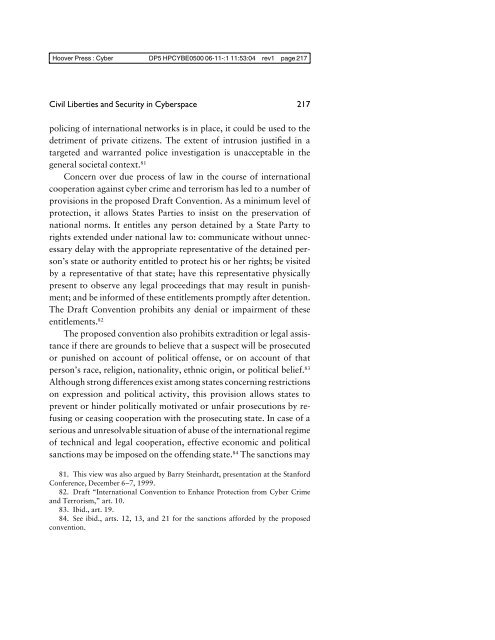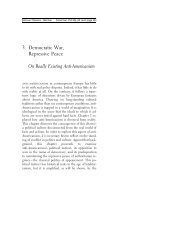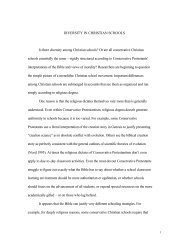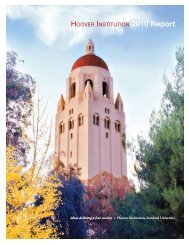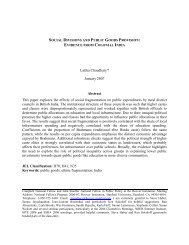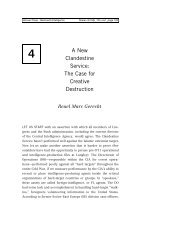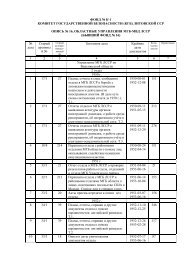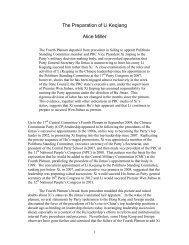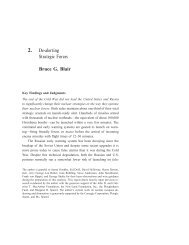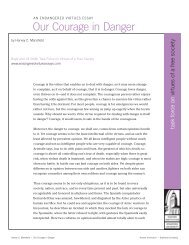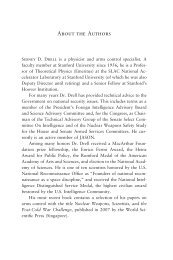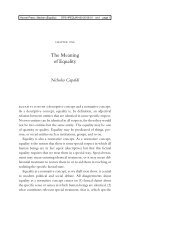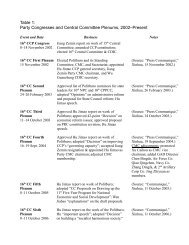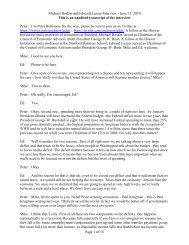Civil Liberties and Security in Cyberspace - Hoover Institution
Civil Liberties and Security in Cyberspace - Hoover Institution
Civil Liberties and Security in Cyberspace - Hoover Institution
You also want an ePaper? Increase the reach of your titles
YUMPU automatically turns print PDFs into web optimized ePapers that Google loves.
<strong>Hoover</strong> Press : Cyber DP5 HPCYBE0500 06-11-:1 11:53:04 rev1 page 217<br />
<strong>Civil</strong> <strong>Liberties</strong> <strong>and</strong> <strong>Security</strong> <strong>in</strong> <strong>Cyberspace</strong><br />
217<br />
polic<strong>in</strong>g of <strong>in</strong>ternational networks is <strong>in</strong> place, it could be used to the<br />
detriment of private citizens. The extent of <strong>in</strong>trusion justified <strong>in</strong> a<br />
targeted <strong>and</strong> warranted police <strong>in</strong>vestigation is unacceptable <strong>in</strong> the<br />
general societal context. 81<br />
Concern over due process of law <strong>in</strong> the course of <strong>in</strong>ternational<br />
cooperation aga<strong>in</strong>st cyber crime <strong>and</strong> terrorism has led to a number of<br />
provisions <strong>in</strong> the proposed Draft Convention. As a m<strong>in</strong>imum level of<br />
protection, it allows States Parties to <strong>in</strong>sist on the preservation of<br />
national norms. It entitles any person deta<strong>in</strong>ed by a State Party to<br />
rights extended under national law to: communicate without unnecessary<br />
delay with the appropriate representative of the deta<strong>in</strong>ed person’s<br />
state or authority entitled to protect his or her rights; be visited<br />
by a representative of that state; have this representative physically<br />
present to observe any legal proceed<strong>in</strong>gs that may result <strong>in</strong> punishment;<br />
<strong>and</strong> be <strong>in</strong>formed of these entitlements promptly after detention.<br />
The Draft Convention prohibits any denial or impairment of these<br />
entitlements. 82<br />
The proposed convention also prohibits extradition or legal assistance<br />
if there are grounds to believe that a suspect will be prosecuted<br />
or punished on account of political offense, or on account of that<br />
person’s race, religion, nationality, ethnic orig<strong>in</strong>, or political belief. 83<br />
Although strong differences exist among states concern<strong>in</strong>g restrictions<br />
on expression <strong>and</strong> political activity, this provision allows states to<br />
prevent or h<strong>in</strong>der politically motivated or unfair prosecutions by refus<strong>in</strong>g<br />
or ceas<strong>in</strong>g cooperation with the prosecut<strong>in</strong>g state. In case of a<br />
serious <strong>and</strong> unresolvable situation of abuse of the <strong>in</strong>ternational regime<br />
of technical <strong>and</strong> legal cooperation, effective economic <strong>and</strong> political<br />
sanctions may be imposed on the offend<strong>in</strong>g state. 84 The sanctions may<br />
81. This view was also argued by Barry Ste<strong>in</strong>hardt, presentation at the Stanford<br />
Conference, December 6–7, 1999.<br />
82. Draft “International Convention to Enhance Protection from Cyber Crime<br />
<strong>and</strong> Terrorism,” art. 10.<br />
83. Ibid., art. 19.<br />
84. See ibid., arts. 12, 13, <strong>and</strong> 21 for the sanctions afforded by the proposed<br />
convention.


